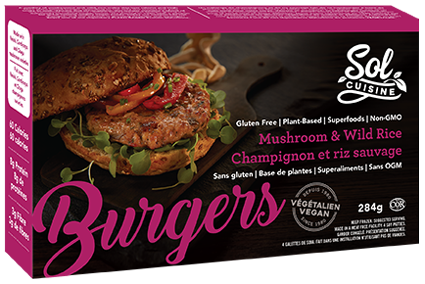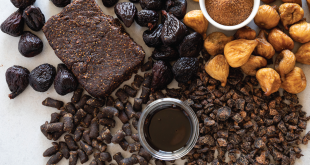Background: Sol Cuisine was established in 1996 by Dror Balshine, and pioneered plant-based protein foods in Canada by tapping into a unique and mostly untouched market at that time. Ingredients are sourced locally wherever possible, and all products are 100 per cent plant-based, Non-GMO Project Verified, kosher and halal, produced at its 35,000-sq.ft. manufacturing facility in Ontario, which has SQF GFSI global certification in food safety.
“The company and its products have evolved as tastes have changed,” Balshine says, “and the recent decision to update the packaging and products was based on the need to elevate the branding to match the quality of the product profile. We now have studies that say more than half of Canadians, at 53 per cent, are choosing to eat plant-based foods.** That’s incredible, and far exceeds demand when we started out. We’ll continue to evolve and map to our mission to make nutrient-dense food that is accessible, available and delivers on taste.”
Strategy: “We recently launched a rebrand of our mission and revamped all packaging, which now features beautiful photography to showcase strong appetite appeal,” Balshine explains. “The packaging truly reflects the quality and texture of the plant-based protein foods within. We even refreshed our logo to reflect the simple and natural ingredients in the recipes, and the artisanal essence of the product line.”
Newly launched products include the Sunflower Beet Burger, Portobello Quinoa Burger, Lemon Dill Salm’n Burger and three appetizer/entrée options: Greek Moussaka Meatballs (the first lamb substitute in the market), Zesty Italian Meatballs and Ancient Grains Chik’n Tenders. In total, Sol Cuisine offers eight plant-based burgers and four plant-based protein entrees, plus Veggie Breakfast Sausages.
“We have an in-house R&D team,” Balshine says, “which allows for strength and speed of innovation. Our R&D team has gone through several variations of product development to enhance taste, texture and nutrition of our lineup. One of the biggest concerns that consumers have with veggie burgers, in addition to taste and nutritionals, is texture. We’ve definitely improved both the texture and flavour in all of our products to meet consumer demand. We want to demonstrate that you don’t have to sacrifice taste when you eat plant-based.”
Results: Sol Cuisine’s sales growth from 2016 to 2019 was more than 161 per cent. Following the brand refresh, Canadian retail sales grew 42 per cent the following the year. “We are very pleased to see that consumers are embracing our new look,” Balshine adds. “The category is growing by leaps and bounds but, at the end of the day, consumers’ taste buds and their ability to read labels and seek out powerful ingredients that nourish their bodies will be key to a brand’s survival as Canadians strive for healthier choices.”
Summary: “Sol Cuisine was born out of my passion for both food and business,” says Balshine. “As a vegetarian, it spoke to my mission to impact health, animal welfare and environmental issues at the same time. The goal has always been to provide choices to consumers looking to reduce the amount of meat they consume, with minimal processing and a clean ingredient panel.”

 Canadian Food Business
Canadian Food Business




